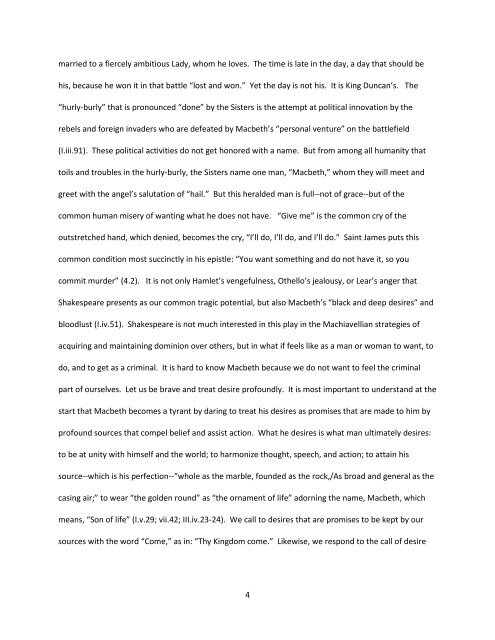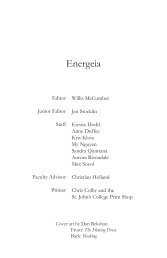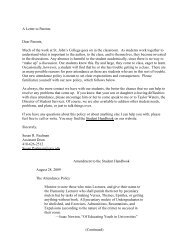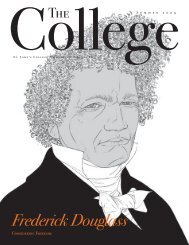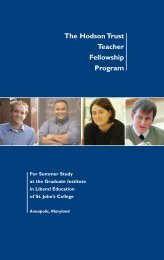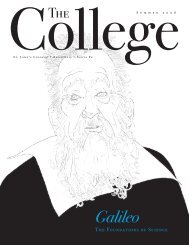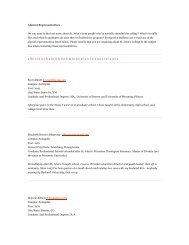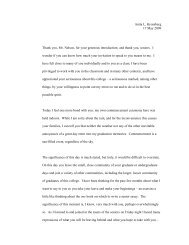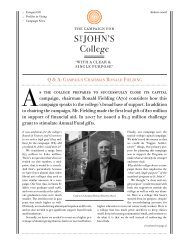âTo Meet with Macbeth,â given by tutor Louis ... - St. John's College
âTo Meet with Macbeth,â given by tutor Louis ... - St. John's College
âTo Meet with Macbeth,â given by tutor Louis ... - St. John's College
Create successful ePaper yourself
Turn your PDF publications into a flip-book with our unique Google optimized e-Paper software.
married to a fiercely ambitious Lady, whom he loves. The time is late in the day, a day that should be<br />
his, because he won it in that battle “lost and won.” Yet the day is not his. It is King Duncan’s. The<br />
“hurly-burly” that is pronounced “done” <strong>by</strong> the Sisters is the attempt at political innovation <strong>by</strong> the<br />
rebels and foreign invaders who are defeated <strong>by</strong> <strong>Macbeth</strong>’s “personal venture” on the battlefield<br />
(I.iii.91). These political activities do not get honored <strong>with</strong> a name. But from among all humanity that<br />
toils and troubles in the hurly-burly, the Sisters name one man, “<strong>Macbeth</strong>,” whom they will meet and<br />
greet <strong>with</strong> the angel’s salutation of “hail.” But this heralded man is full--not of grace--but of the<br />
common human misery of wanting what he does not have. “Give me” is the common cry of the<br />
outstretched hand, which denied, becomes the cry, “I’ll do, I’ll do, and I’ll do.” Saint James puts this<br />
common condition most succinctly in his epistle: “You want something and do not have it, so you<br />
commit murder” (4.2). It is not only Hamlet’s vengefulness, Othello’s jealousy, or Lear’s anger that<br />
Shakespeare presents as our common tragic potential, but also <strong>Macbeth</strong>’s “black and deep desires” and<br />
bloodlust (I.iv.51). Shakespeare is not much interested in this play in the Machiavellian strategies of<br />
acquiring and maintaining dominion over others, but in what if feels like as a man or woman to want, to<br />
do, and to get as a criminal. It is hard to know <strong>Macbeth</strong> because we do not want to feel the criminal<br />
part of ourselves. Let us be brave and treat desire profoundly. It is most important to understand at the<br />
start that <strong>Macbeth</strong> becomes a tyrant <strong>by</strong> daring to treat his desires as promises that are made to him <strong>by</strong><br />
profound sources that compel belief and assist action. What he desires is what man ultimately desires:<br />
to be at unity <strong>with</strong> himself and the world; to harmonize thought, speech, and action; to attain his<br />
source--which is his perfection--“whole as the marble, founded as the rock,/As broad and general as the<br />
casing air;” to wear “the golden round” as “the ornament of life” adorning the name, <strong>Macbeth</strong>, which<br />
means, “Son of life” (I.v.29; vii.42; III.iv.23-24). We call to desires that are promises to be kept <strong>by</strong> our<br />
sources <strong>with</strong> the word “Come,” as in: “Thy Kingdom come.” Likewise, we respond to the call of desire<br />
4


